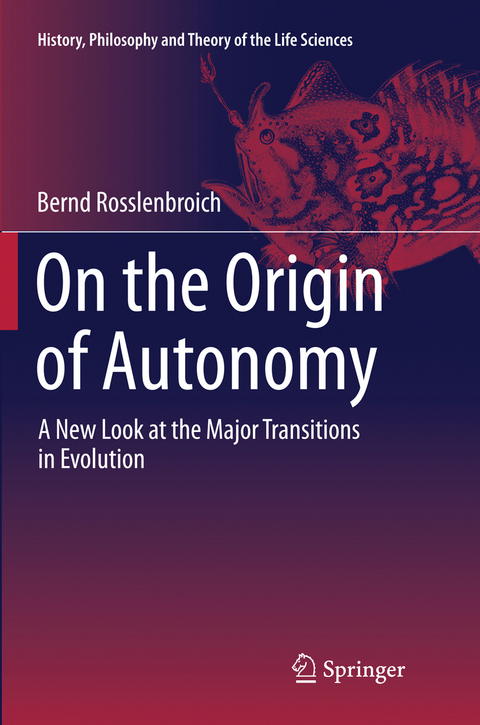
On the Origin of Autonomy
Springer International Publishing (Verlag)
978-3-319-35386-9 (ISBN)
This volume describes features of autonomy and integrates them into the recent discussion of factors in evolution. In recent years ideas about major transitions in evolution are undergoing a revolutionary change. They include questions about the origin of evolutionary innovation, their genetic and epigenetic background, the role of the phenotype and of changes in ontogenetic pathways. In the present book, it is argued that it is likewise necessary to question the properties of these innovations and what was qualitatively generated during the macroevolutionary transitions.
The author states that a recurring central aspect of macroevolutionary innovations is an increase in individual organismal autonomy whereby it is emancipated from the environment with changes in its capacity for flexibility, self-regulation and self-control of behavior.
The first chapters define the concept of autonomy and examine its history and its epistemological context. Later chapters demonstrate how changes in autonomy took place during the major evolutionary transitions and investigate the generation of organs and physiological systems. They synthesize material from various disciplines including zoology, comparative physiology, morphology, molecular biology, neurobiology and ethology. It is argued that the concept is also relevant for understanding the relation of the biological evolution of man to his cultural abilities.
Finally the relation of autonomy to adaptation, niche construction, phenotypic plasticity and other factors and patterns in evolution is discussed. The text has a clear perspective from the context of systems biology, arguing that the generation of biological autonomy must be interpreted within an integrative systems approach.
What is the outcome of evolution?.- The problem of macroevolutionary trends.- The concept of biological autonomy.- The major transitions in early evolution.- The Cambrian explosion and thereafter.- Fluid management in animals.- Reproduction.- Nervous systems and the flexibility of movements.- Endothermy.- The evolution of brains and behavior: is there a trend?.- The evolution of man.- Conclusion and implications.
"The core of Rosslenbroich's book is a series of chapters examining the evolutionary trajectory of autonomy in more detail, through the lenses of history and function. The depth of the treatment of evidence is remarkable, his command of principles and facts of anatomy and physiology enviable." (Daniel W. McShea, Biology & Philosophy, Vol. 30 (3), May, 2015)
"The volume explores the nature of biological autonomy and its application to understanding major evolutionary trends. ... this is an important book that deserves to play a role in the reforming of an updated evolutionary synthesis; it will appeal to evolutionary biologists, philosophers of science, and even zoologists who will accordingly reconsider morphological, anatomical, physiological, and behavioral features of animal life in a new, dynamic context." (Mark Riegner, The Quarterly Review of Biology, Vol. 90 (1), March, 2015)
"I recommend the book as a fine blend of thought-provoking holism, built around a conscientious survey of the deeper implications of dynamic systems and process thinking, essential to revise our still-too-static view of biology, and incorporate a mature understanding of autonomy." (Martin Lockley, Acta Biotheoretica, August, 2014)| Erscheinungsdatum | 15.09.2016 |
|---|---|
| Reihe/Serie | History, Philosophy and Theory of the Life Sciences |
| Zusatzinfo | XII, 297 p. 61 illus. |
| Verlagsort | Cham |
| Sprache | englisch |
| Maße | 155 x 235 mm |
| Themenwelt | Geisteswissenschaften ► Philosophie |
| Naturwissenschaften ► Biologie ► Evolution | |
| Schlagworte | Biological autonomy • Biological autonomy and integrative systems approa • Biological autonomy and integrative systems approach • Cambrian explosion • Evolution • evolutionary biology • Evolutionary innovations • Evolution of brains and behavior • Extended evolutionary synthesis • Fluid management in animals • History of Science • Increasing autonomy in evolution • macroevolution • Macroevolutionary innovations • Macroevolutionary trends • Major transitions in evolution • Nervous systems and the flexibility of movements • Organismic biology • Philosophy • Philosophy of Biology • Religion and Philosophy • systems biology |
| ISBN-10 | 3-319-35386-1 / 3319353861 |
| ISBN-13 | 978-3-319-35386-9 / 9783319353869 |
| Zustand | Neuware |
| Haben Sie eine Frage zum Produkt? |
aus dem Bereich


